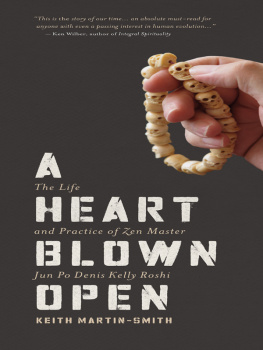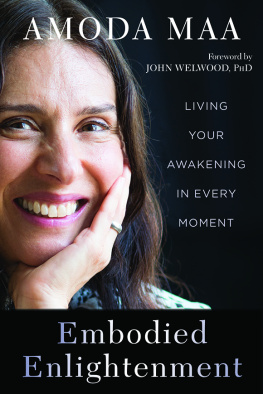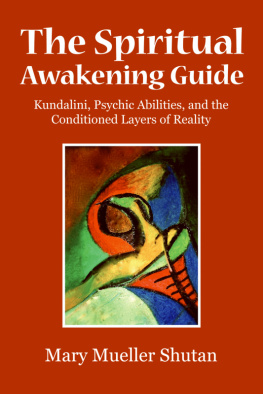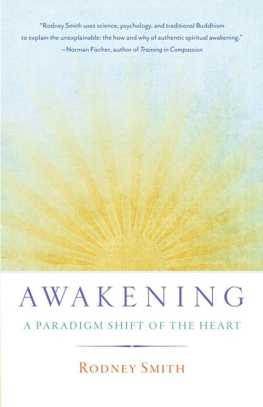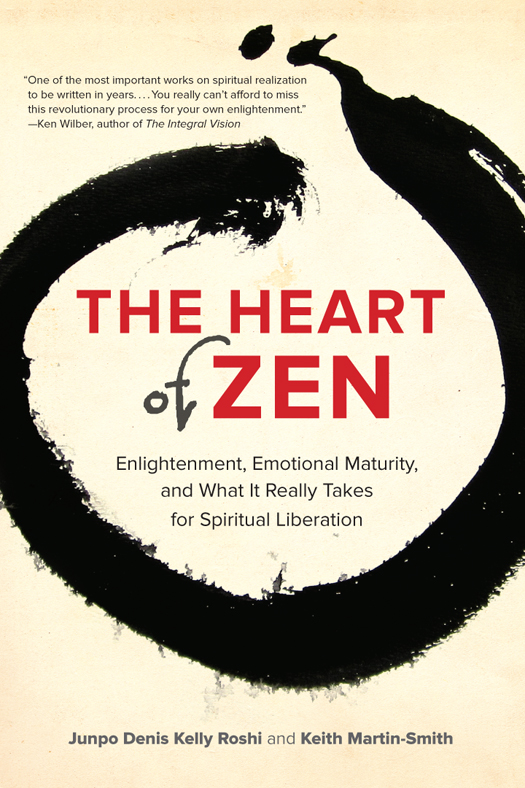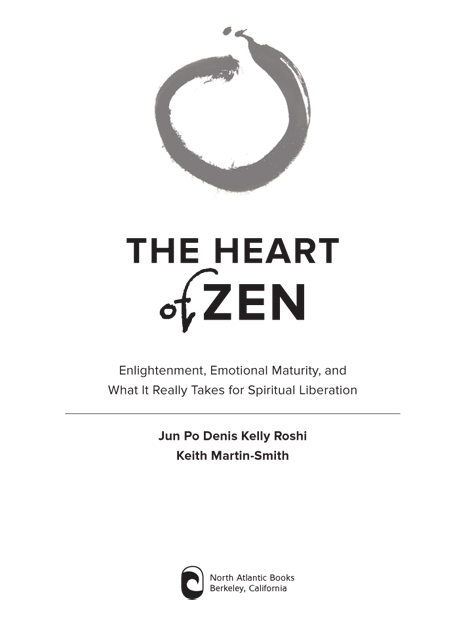ALSO BY KEITH MARTIN-SMITH
A Heart Blown Open: The Life and Practice of Zen Master
Jun Po Denis Kelly Roshi
Electronic Edition: ISBN 978-1-58394-778-4
Copyright 2014 by Jun Po Denis Kelly Roshi and Keith Martin-Smith. All rights reserved. No portion of this book, except for brief review, may be reproduced, stored in a retrieval system, or transmitted in any form or by any meanselectronic, mechanical, photocopying, recording, or otherwisewithout the written permission of the publisher. For information contact North Atlantic Books.
Published by
North Atlantic Books
P.O. Box 12327
Berkeley, California 94712
Cover art by Mark T. Smith (www.marktsmith.com)
Cover and book design by Claudia Smelser
The Heart of Zen: Enlightenment, Emotional Maturity, and What It Really Takes for Spiritual Liberation is sponsored by the Society for the Study of Native Arts and Sciences, a nonprofit educational corporation whose goals are to develop an educational and cross-cultural perspective linking various scientific, social, and artistic fields; to nurture a holistic view of arts, sciences, humanities, and healing; and to publish and distribute literature on the relationship of mind, body, and nature.
North Atlantic Books publications are available through most bookstores. For further information, call 8007333000 or visit our website at www.northatlanticbooks.com.
The Library of Congress has cataloged the printed edition as follows:
Kelly, Jun Po Denis, 1942 author.
The heart of Zen : enlightenment, emotional maturity, and what it really takes for spiritual liberation / Jun Po Denis Kelly Roshi, Keith Martin-Smith.
pages cm
Summary: Insights on Zen meditation and koan practice and edgy, passionate dialogues between teacher and student address the issues of emotional integration and maturity Provided by publisher.
ISBN 978-1-58394-764-7 ISBN 978-1-58394-778-4
1. Spiritual lifeZen Buddhism. 2. MeditationZen Buddhism. I. Martin-Smith, Keith, 1972 author. II. Title.
BQ9286.K42 2014
294.3444dc23
v3.1
TO THE GREEN TARAS IN OUR LIVES
Vicara Mary Connelly
Sara Avant Stover
CONTENTS
INTRODUCTION
I have known Jun Po since 2007, and in 2009 I began collaborating with him to create his award-winning biography A Heart Blown Open. That book covered the entire arc of his remarkable life, ending with his creation of an entirely new form of Zen that he calls Mondo Zen. This book picks up where A Heart Blown Open left off, focusing entirely on the body of what he has created, born of his insight and experience.
The Heart of Zen was created out of conversations Jun Po and I had over many months, starting in the spring of 2012 and ending about nine months later. He has a direct, literal way of speaking, and when I began to transcribe our conversations I noticed that a lot of what he was saying wasnt translating as clearly as we wanted onto the page. Because of this, I added in explanations, slowing everything down and making it, I hope, much clearer.
The changes I made in the manuscript would go back to him, and he would edit and correct any mistakes I had made. Once a week or so, we would talk through some of the more complicated parts of the book. Working this way, back and forth, was something we had already become quite good at over the two years it took me to write A Heart Blown Open.
So it was that we slowly crafted this book out of our live conversations and the back and forth that followed. Our desire was to make what we were saying clear to those who have not trained in Zen, and have not spent the majority of their lives in spiritual pursuits.
It is our hope that the words here will act as a guide and a path toward a life of deeper spiritual insight, emotional maturity, and lived compassion.
HISTORICAL OVERVIEW
The historical Buddha was a man named Siddhartha Gautama, born in the sixth century BCE. He was an Indian prince who renounced his throne and his wealth to find wisdom and liberation that transcended power, money, or egoic satisfaction, all things he had been handed at birth. He began the study and practice of yoga for eight years, and then asceticism for four more. Frustrated with his inability to liberate himself from his own suffering and mental delusion, he sat down in meditation and resolved to stay until he freed himself from his own mind. Legend holds he sat for forty days. However long he really sat, it was long enough to Awaken from the dream of his own suffering. Siddhartha then took the name Buddha, which simply means Awakened. He Awakened from the dream of a separate self that had kept him, like so many of us, in bondage.
Once he Awakened, or became fully Enlightened, he founded his own yoga school. He taught the philosophy and practical disciplines that he had used to liberate himself and end his ego suffering. Remarkably, he taught for about fifty years, traveling through India with his disciples and speaking about how others might attain the same state of liberation that he possessed. His very long life and long time teaching meant that, unlike many other religious teachers, the Buddha was able to offer very clear instructions on meditation and other foundations for Buddhist thought and practice, and to clarify the many mistakes that arose when people misinterpreted what he was saying.
Although he did not personally write anything down, historical records indicate that his first cousin, who came to be known as Ananda, possessed a great memory and traveled with the Buddha for at least twenty years, sometimes teaching in his place. When Siddhartha died, his followers realized that they needed to record his teachings as quickly as possible before they were lost or misinterpreted. Within a year they had convened the First Buddhist Council. This was called around the year 540 BCE, creating what became known as the Pali Canon, the written record of the Buddhas teaching.
The Pali Canon had three parts. The first was composed of rules for the conduct of monks and nuns. The third contained the philosophy and metaphysics of Buddhist thought. The second and most important part of the canon was called the Sutta Pitaka, the spoken discourses and direct teachings of the Buddha himself. These came directly from Ananda, who faithfully reported all he could remember about his teacher.
Since the time of the Buddha, there have been many, many hundreds of Enlightened masters, both men and women, who have carried on these teachings and insights, right into today. Through the insight of modern-day master philosophers and mystics such as Huston Smith, Saint Teresa Benedicta of the Cross, Aldous Huxley, Marianne Williamson, Joseph Campbell, and Ken Wilber, just to name a few, we have come to understand that Enlightenment is not something contained in Buddhism or limited to a particular religion, but a state of consciousness that can be realized by anyone, in any tradition, at any time.
This book is composed of the teachings of Jun Po Denis Kelly Roshi, the eighty-third patriarch in the Rinzai Zen tradition, which traces itself all the way back to Siddhartha Gautama himself. This book is the accumulation of Jun Pos life and his insight, which started in the West, went to the East, and finally came back to integrate both. It is the story of our times, and designed to connect the 1,000-mile journey between your head and your heart in just a single step. It will teach you emotional maturity, spiritual insight, and how to use the darkest and most problematic parts of your personality as the very tools of your own Awakening.


